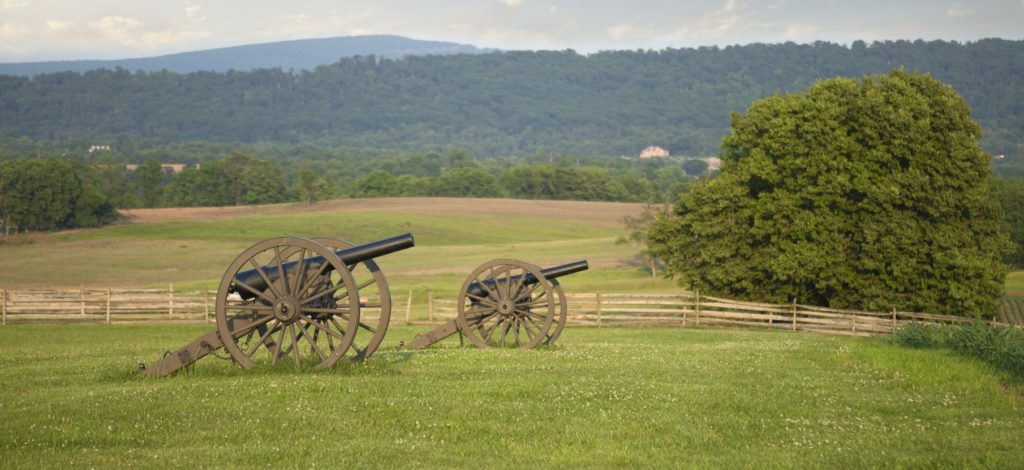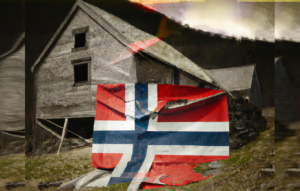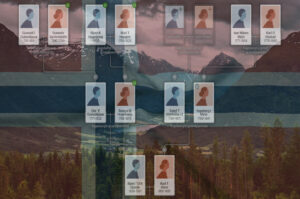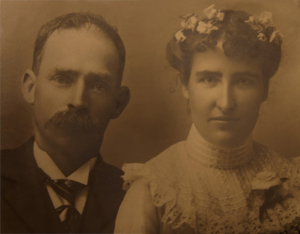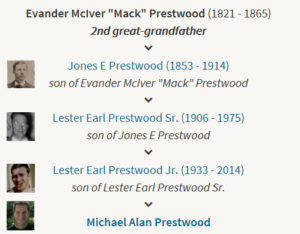 Update: This article was first published in the book “Prestwood-Flint Family History 2017” by Michael Alan Prestwood. The following is the updated version of this article. I am currently updating this article as of February 2023.
Update: This article was first published in the book “Prestwood-Flint Family History 2017” by Michael Alan Prestwood. The following is the updated version of this article. I am currently updating this article as of February 2023.
Most of my family does not know the name of my great grandfather Jones Prestwood, nor of his father Evander Prestwood, nor the history of Evander and his brothers in the Civil War. Appropriately so, people prefer to focus on living in the here and now. Most are mildly curious about their family history and the question, “Where did I come from?” Sadly, that curiosity usually does not peak until after one’s parents die. By that time, much family history is gone. From generation to generation, much is lost. Luckily, more and more databases are coming online and one can research and put together some family stories.
It is hard for me to learn that my family history includes fighting for the South in the Civil War. But, family history is about truth whether that truth is glorious, disappointing, or tragic. This story is one of the sad and tragic stories of my family.
The Civil War
Was the Civil War about slavery? Or, the right of states to secede from the union? Both? Either way, the Civil War in many ways settled both issues, states do not have the right to secede from the union and slavery was abolished. Since before the American Revolution, the debate over slavery was part of the political landscape. Some, even from the beginning, felt strongly to abolish it– the abolitionists. For example, my 10th Great Grandpa Roger Williams (1602-1683) founded Providence, Rhode Island with freedom of religion in mind and is frequently referred to as America’s first abolitionist. However, from the beginning, some felt strongly that it should be kept. This great struggle was deep and was not solved with the forming of the U.S.A. constitution. Instead, a great compromise was formed. It would not be resolved for another 80+ years — 246 years from the time first slaves were brought to America. Like all issues, many in both the North and South had mixed feelings. The number of slaves was growing every year at a substantial rate. In 1790, there were about 680,000 slaves in America. Nearly 4 million slaves (people) were freed after the Civil War.
North Carolina Before and During the Civil war
In North Carolina, there were plantations with a long history of slavery on the Coastal Plains. In 1860, North Carolina was an active slave state with one-third of the population enslaved. About 28% of the families in North Carolina owned over 330,000 slaves including 133 families owning 100+ slaves. Of note, owners of 20+ slaves did not have to fight in the civil war. Another example of rich getting the poor to fight their wars. There were no plantations and few slaves in the mountainous western part of the state including Caldwell County where the Prestwood brothers owned farms. They lived their entire lives in western North Carolina and never owned slaves. Far different geography and life-style from the flat coastal plains of North Carolina.
North Carolina enters the war five weeks into the conflict. Initially, NC was reluctant to secede from the Union even after it became clear that Abraham Lincoln had won the presidential election. NC did not secede until May 20, 1861, after the fall of Fort Sumter, and the secession of Virginia.
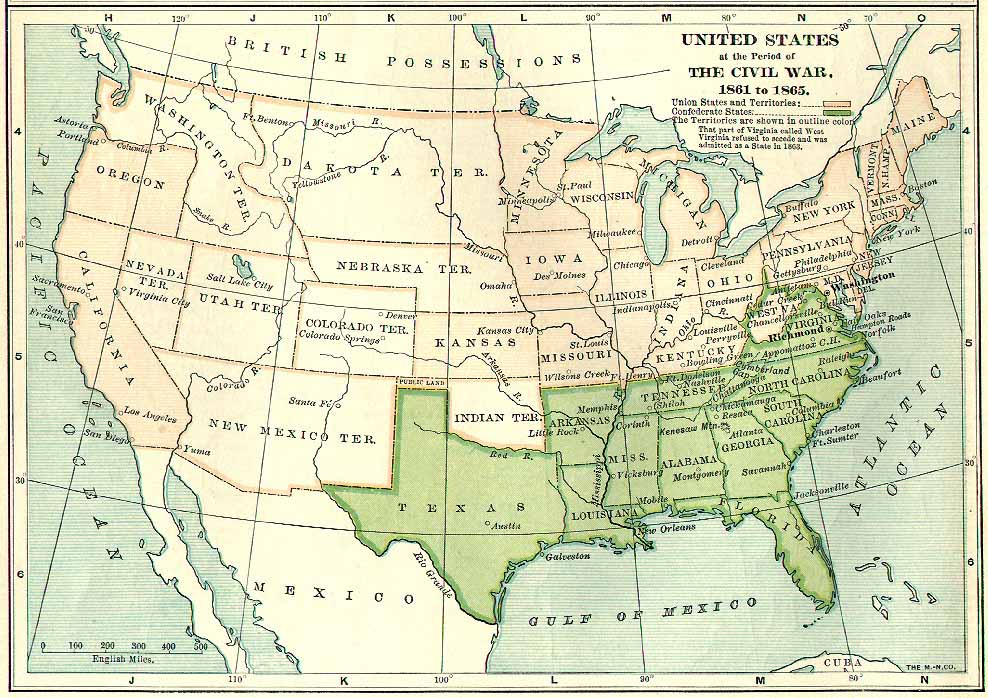
The Prestwood Brothers
My 2nd Great-Grandpa Evander McIver “Mack” Prestwood was the firstborn (of seven) to William Thomas “Billy” Prestwood and Celia Clarke. Billy, Evander’s dad, was a teacher by profession but also a commissioned officer for both South and North Carolina, amateur astronomer, mathematician, naturalist, surveyor, and linguist. He could read Latin, Greek, and Hebrew and kept a daily cryptic diary from 1808 to 1859 detailing everyday life in North Carolina as well as documenting family history. Both parents died a few years before the start of the Civil War.
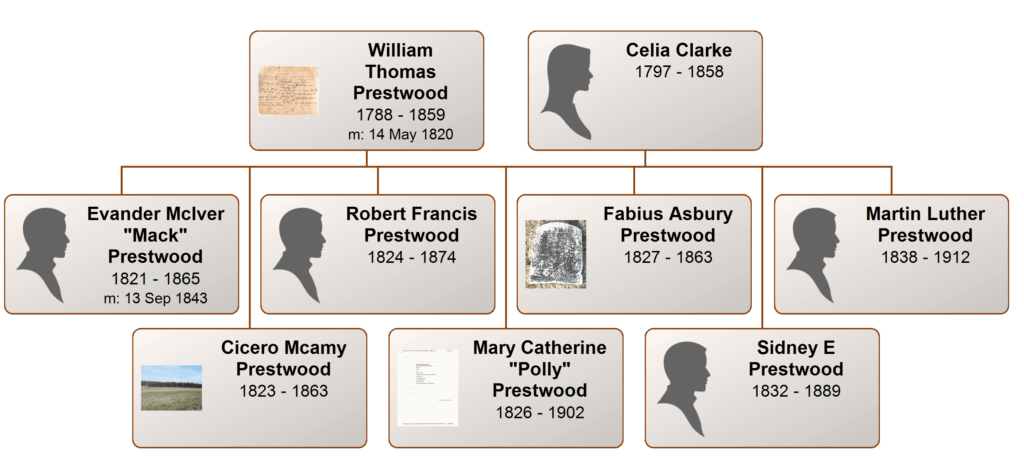
I have no evidence that any of the Prestwood brothers were abolitionist (against slavery), nor what their feelings were on the subject. Although there were no big plantations in the area, about 20% of their neighbors did own anywhere from 1 to 12 slaves. The only circumstantial evidence regarding the brothers is that none of the brothers owned slaves, and Martin “Luther” Prestwood switched sides after he was captured indicating he did not have deep ties to the Southern effort. But, when it came time to fight, five of the six brothers fought as Confederate soldiers in the civil war: Evander, Cicero, Fabius, Sidney, and Luther. I cannot find any evidence that Robert fought in the civil war.
26th Regiment: The Hibriten and Caldwell Guards
The 26th Regiment of North Carolina was comprised of ten companies raised from the middle and western portions of North Carolina (one company also had recruits from Grayson County, Virginia). The 26th is infamous for being the regiment with the largest number of casualties on both sides during the war. Those enlisted from Lenior, Caldwell County, home of 4 of 5 Prestwood brothers, were put into the 26th Regiment in either Company F or Company I (“i”). Company F was known as The Hibriten Guards. Company I was known as The Caldwell Guards.
Four of five brothers served in the 26th Regiment: Evander, Cicero, Fabius, and Luther. Evander and Cicero served in Company F, but not at the same time. Fabius and Luther served together in Company I for about 15 months from early 1862 to shortly after Gettysburg.
Fabius and Luther at Gettysburg
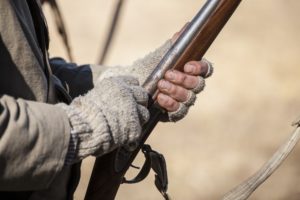
The 26th Regiment played a major role at the defeat of the South at Gettysburg – including the Prestwood brothers Fabius, and Luther. The 26th Regiment started the first day of the Battle with 800 men. By sunset, 588 of them were either dead or wounded. Yelling like demons, they had courageously charged and taken the formidable federal position on Seminary Ridge. All 90 soldiers in the 26th’s Company F had fallen. The 26th Regiment was not used on day 2. On Day 3 they were used again, this time only 90 soldiers returned to the confederate side. The 26th Regiment lost 88% of their men at Gettysburg. The two Prestwood brothers fought on, for now.
Luther, Captured Retreating from Gettysburg, Survived (17 Months for the South, North Unknown)
Martin “Luther” Prestwood was the first of the Prestwood brothers to enlist at age 23 on November 30, 1861. He was assigned to the 26th Regiment, Company I. At the time, his wife was six months pregnant. He was the only Prestwood brother to serve in the 26th Regiment and survive the war. He was captured July 14, 1863 while retreating from Gettysburg at the Battle of Falling Waters. He was captured just 9 days after his brother Fabius was captured.
He was released seven months later on February 10, 1864 after switching sides and taking the oath of allegiance and joining the United States Army. Luther was a Corporal in the United States Army. He fought in Company D against the insurrectionists from February 10, 1864 until November 27, 1865. By this time, both Fabius and Cicero are dead, but Evander had not yet enlisted. One wonders if Luther ever saw any engagements for the North. If so, did he ever face his own brother Evander? After the war, Luther returned to the family but family folklore says he was not welcomed, at least at first, for switching sides. He stayed in NC and had another six kids so one can assume the family eventually forgave him.
Fabius, Captured at Gettysburg, Dies a POW (Served 19 Months)
Fabius, a farmer and father of 4, at age 35 enlists 3 months after Luther on March 15, 1862. He was assigned to the 26th Regiment, Company I where his brother Luther was assigned. He was captured at the famous battle of Gettysburg on July 5, 1863. The intense battle involved the largest number of casualties of the entire war and took place for 3 days from July 1 through July 3. (Of note, Fabius was reported “missing” on July 3rd.) On the 4th of July, both armies paused the war in honor of the 89th birthday of the country. The two armies stared at one another in a heavy rain across the bloody fields. The southern army under General Robert E. Lee started their retreat late July 4th. The United States Army under General Ulysses S. Grant pursued. Fabius was captured the next day. He died a POW, from disease, just three months later on October 1, 1863.
Sidney, 58th Regiment, Survived (Served 28 Months)
Sidney at age 30 enlists two months after Fabius on May 17, 1862. Sidney, a saddler and father of one when he enlisted had a second child during the war, and a third after the war. Sidney was assigned to Company B of the 58th Regiment, North Carolina because he had moved about 120 miles away to Yancey County sometime between 1850 and when he was married in 1853. The 58th Regiment was organized in Mitchell County and made up of troops from Mitchell and surrounding counties including Yancey. Promoted to Full Corporal on March 1, 1863. Mustered out (released from the military) on September 10, 1864 (one day after the war’s end). He served until the end of the war and survived.
Cicero, Killed at the Battle of Bristoe (Served 2 Months)
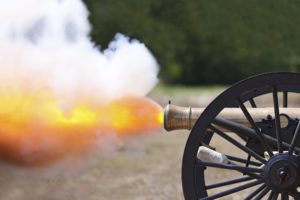
Cicero at age 39 enlists 15 months after Sidney enlists on August 20, 1863. He was assigned to the 26th Regiment, Company F. At the time he enlisted, all the brothers were still alive. Cicero, a farmer and father of 7, was killed at the famous Battle of Bristoe Station just 13 days after Fabius died as a POW from disease and just three months after Gettysburg. The battle took place in Dumfries, Virginia on October 14, 1863. Led by General Robert E. Lee, Cicero was one of 1,380 confederate soldiers to die that day.
Evander Enlists 7 Months Before the End, Dies a POW (Served 8 Months)
My 2nd Great-Grandpa Evander could neither read nor write despite the fact that his father Billie was somewhat of a scholar (a school teacher and could read/write 4 languages). Evander, at age 43 enlists 14 months after Cicero on October 8, 1864, and after two of his brothers had died in the war. The oldest brother, he was assigned to the 26th Regiment, Company F. At the time, he had been married 21 years and was a farmer working his own farm. He had no slaves. He and Caroline had 9 children ranging from their 20-year-old firstborn Gooly Ann Prestwood to their 10 day old John Vance Prestwood. Evander enlisted in the 26th Regiment about a year after his three brothers who served in the 26th were captured or dead.
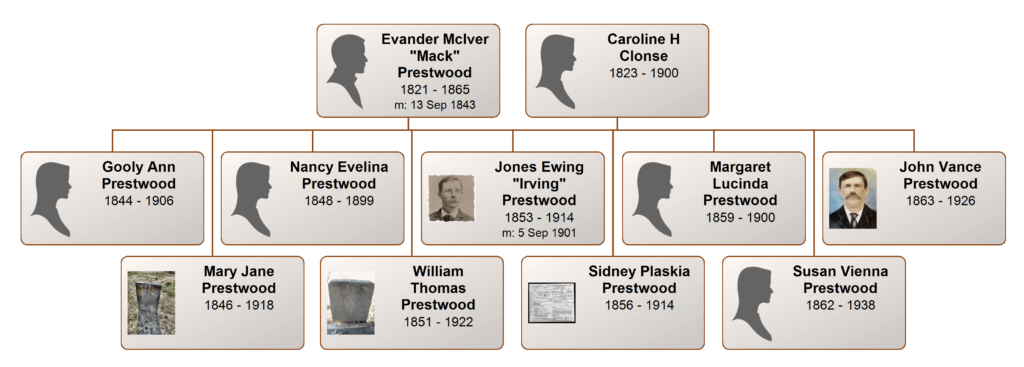
The following clip of Evander’s family is from the 1860 Federal Census taken June 12, 1860:
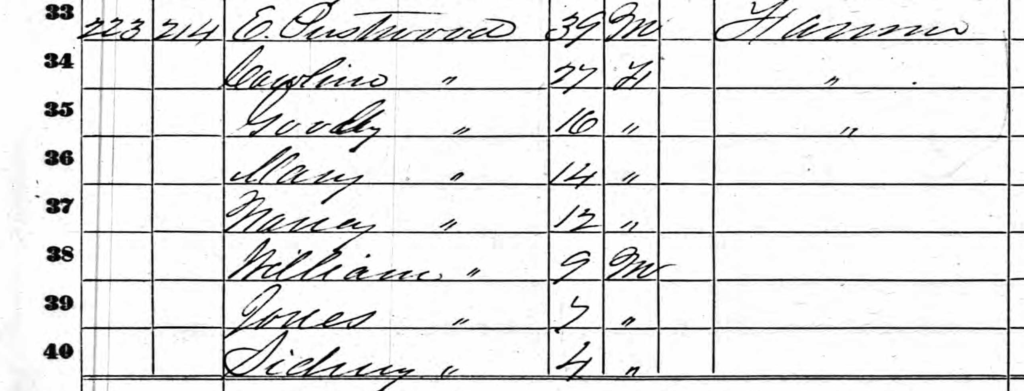
The following clip is from his civil war records, a company muster roll from Nov/Dec 1864. It shows his enlistment data. In most cases, muster roll calls were taken by the commanding officer and written up by a copyist. Hence, the use of the name “Ervand Preswood”.
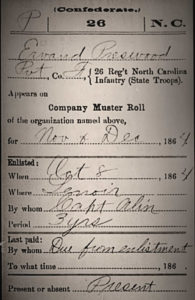
Evander was captured in Virginia at Hatcher’s Run on April 2, 1865 about two months after the famous Battle of Hatcher’s Run. Evander was captured just 12 days before Lincoln was assassinated on April 14, 1865 and about one month before the end of the civil war which ended May 9, 1865. He was captured some 270 miles from his home and was marched about 350 miles to confinement either at Elmira Prison (some 620 miles from home) first, or perhaps directly to nearby Hart’s Island. For sure, on April 7, 1865, Evander was entered into the prison on Hart’s Island in the New York Harbor.
Hart’s Island prison as sketched in 1865:
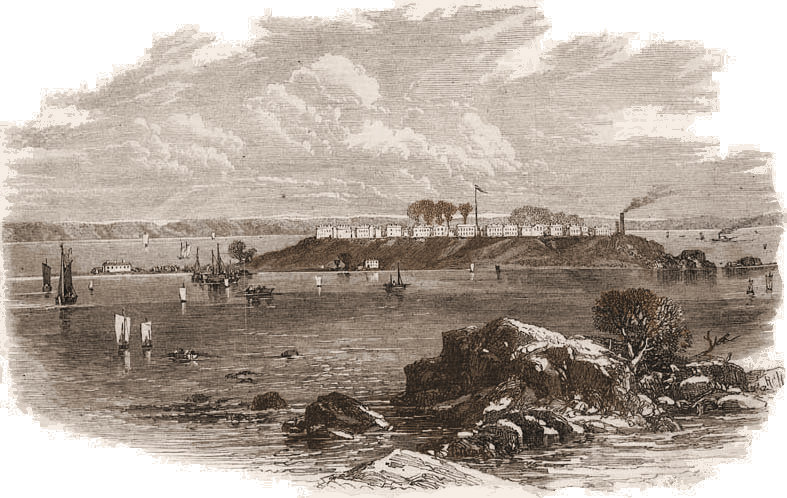
Evander, a farmer and father of 9, died on June 11, 1865, of meningitis some 33 days after the end of the Civil War and just weeks before the last of the prisoners on Hart’s Island were released. He is buried in Cypress Hills National Cemetery in Brooklyn in Section 1, grave #2994.
The following clip is from Evander’s civil war records. It shows he was a POW at Hart’s Island. Plus Evander’s gravestone.
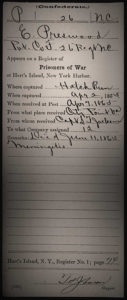 |
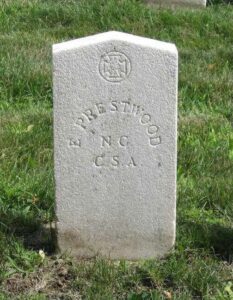 |
February 2023 Comment by Robby Preswood via Facebook: My 2nd great grandfather John Vance Prestwood was Evander’s youngest and was barely 2 when Evander died in the POW camp. [According to family lore.] [John Vance] was sent to live with his aunt in Grandfather Community. Just outside of Boone, NC.
Evander’s son Jones, My Great Grandpa
Evander’s kids included my Great-Grandpa Jones E. Prestwood who was a very impressionable 11 years old (turning 12 in a few weeks) when Evander enlisted and was gone forever. Later, after Jones got married and had five children, he would leave his family when he had a newborn and his oldest was 13. This is about the same scenario from Jones’ viewpoint as his dad leaving him and his four younger siblings including their newborn to fight in the Civil War.
Jones moved across the country to Oregon, and about 12 years later started a new family. He had four children and when his oldest was 11 and he had a small baby, and my grandpa was 6 years old, he did it again! He left his second family and attempted to return to his first family. He was rejected and died in a state hospital in 1914. It is unknown if Jones suffered from paternal abandonment issues. Any thoughts would be speculative, but in the vacuum of no other answers, it’s interesting to analyze. But, that’s a story for another day.
A Toll…
620,000 Americans died in the Civil War. Far more than any other war including WWI and WWII combined! The Civil War tore through many families of the South. The Prestwood brothers – farmers and saddlers — paid a heavy toll. Five of six brothers enlisted — all with the rank of Private, the lowest military rank. All four that served in the 26th Regiment were either killed or captured (none received promotions). Three of the four that served in the 26th Regiment died.
—
Appendix: Timeline
The following is a timeline of events:
- 1861
- April 12: Civil War starts.
- May 20: North Carolina secedes from the Union and joins the southern effort.
- November 30: Luther enlists at age 23 (not drafted)
- 1862
- March 15: Fabius enlists at age 35 (not drafted, but might have feared the draft).
- April 16: Draft started. Conscription Act dictated that all healthy white men between the ages of 18 and 35 were liable for a three-year term of service.
- May 17: Sidney enlists, assigned to Company B, 58th
- 1863
- July 1-3: famous Gettysburg battle.
- July 5: Fabius captured at Gettysburg.
- July 14: Luther captured at the Battle of Falling Waters.
- August 20: Cicero enlists at age 39 (NOT drafted, but might have feared the draft).
- September: Draft age limit raised to 45.
- October 1: Fabius dies of disease at Fort Delaware, Delaware.
- October 14: Cicero killed in the Battle of Bristoe Station which took place in Dumfries, Virginia.
- 1864
- February 10: Luther is released and switches sides.
- February: Draft extended to ages 17 to 50.
- October 8: Evander enlists at age 43 (likely drafted)
- 1865
- February 5-7: famous Battle of Hatcher’s Run.
- April 2: Evander captured in Virginia at Hatcher’s Run.
- April 7: Evander entered into the prison on Hart’s Island in the New York Harbor.
- April 14: Lincoln assassinated.
- May 9: Civil War ends.
- June 11: Evander dies of meningitis at Hart’s Island prison just weeks before the last of the POWs are released.

